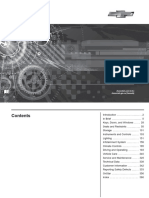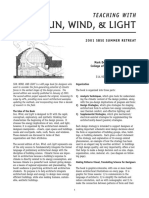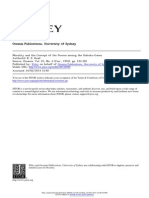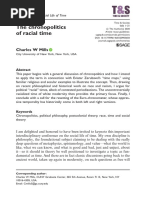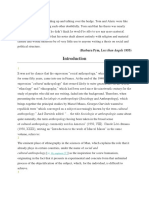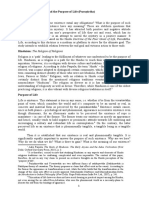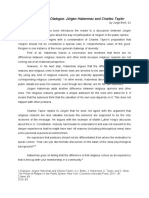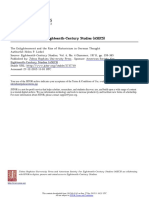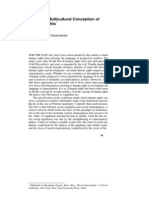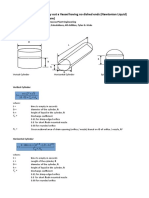Anthropology and Ethics in Common Focus
Anthropology and Ethics in Common Focus
Uploaded by
Andrei NacuCopyright:
Available Formats
Anthropology and Ethics in Common Focus
Anthropology and Ethics in Common Focus
Uploaded by
Andrei NacuOriginal Description:
Copyright
Available Formats
Share this document
Did you find this document useful?
Is this content inappropriate?
Copyright:
Available Formats
Anthropology and Ethics in Common Focus
Anthropology and Ethics in Common Focus
Uploaded by
Andrei NacuCopyright:
Available Formats
Anthropology and Ethics in Common Focus Author(s): Abraham Edel Reviewed work(s): Source: The Journal of the Royal
Anthropological Institute of Great Britain and Ireland, Vol. 92, No. 1 (Jan. - Jun., 1962), pp. 55-72 Published by: Royal Anthropological Institute of Great Britain and Ireland Stable URL: http://www.jstor.org/stable/2844321 . Accessed: 10/12/2011 14:21
Your use of the JSTOR archive indicates your acceptance of the Terms & Conditions of Use, available at . http://www.jstor.org/page/info/about/policies/terms.jsp JSTOR is a not-for-profit service that helps scholars, researchers, and students discover, use, and build upon a wide range of content in a trusted digital archive. We use information technology and tools to increase productivity and facilitate new forms of scholarship. For more information about JSTOR, please contact support@jstor.org.
Royal Anthropological Institute of Great Britain and Ireland is collaborating with JSTOR to digitize, preserve and extend access to The Journal of the Royal Anthropological Institute of Great Britain and Ireland.
http://www.jstor.org
Focus* in Common and Ethics Anthropology
ABRAHAM EDEL Dr May Edel and ofmorality, on thestudy focus intocommon ethics and philosophical ofunusual a had number which of morality concept a I (Edel & Edel I959) proposed it lookedfor description; cultural towards was oriented it place, In the first features. ofthe a map moral to draw asked if one were use might one which thekindofconception descriptive a Such map. religious a or linguistic a draw to asked be globe,as one might thephiloto startle butis likely bythe anthropologist, is takenforgranted orientation thephilowhether Moreover, of moraljudgment. terms in ofmorality whothinks sopher to the on in relation carried not it is usually normative, or approachis analytic sopher's informaas only furnishing enter materials such ofculture; and thestudy socialsciences place, In thesecond and application. areasofillustration tionon meansorelseproviding indepenSuch of culture. dimension independent as a relatively morality we treated on the whois usedtoinsisting by thephilosopher, granted to be takenfor denceis likely the since resistence, with anthropological meet to likely is But it ofmorals. 'autonomy' the of or another one in enmeshed often more is ofmorality treatment anthropological we third In the place, over several. dispersed or description, areasofsocialand cultural of set informal the than broader much morality, of concept a generalized fashioned sharply-etched and the research field in anthropological found indicesthatare usually ethics. informal thatarefound conceptions competing though to someofthe runscounter its investigation and morality of Since thisconception if to theyare to be both, it justification requires habitsin bothdisciplines, established it is theindeTo the anthropologist different respects. inducedto co-operate-butin of the extent the is it the to philosopher, consideration; pendencefocusthatrequires topics, two these to myself to address therefore, like, I should stress. descriptive empirical concepofour proposed on theappropriateness to add a fewcomments and thereafter I need theoretical and purposes. bothdescriptive for useful construct tion,as a scientific analysis detailed the to neither so widea taskI can dojustice add thatin setting scarcely in whichlies the nor to the specificity demands, rightly increasingly thatphilosophy for withgroping content rest I To-day investigation. ofanthropological greatstrength ourquestions. reformulates which vision thelarger
I
A CO-OPERATIVEEXPERIMENTdesigned to bring anthropology and Ethics, IN Anthropology
of entitledThe Institutions Suppose one picksup the littlevolumeof B.B.C. lectures and economic of treatment a finds One al. et I956). (Evans-Pritchard Society Primitive on Religion,Aesthetics, and in addition,lectures familialand politicalinstitutions, within, tucked it Is awaysomewhere is Morality? Where Law, Mind,ModesofThought. base of the at values about There are, it is true,occasionalremarks or just omitted? 55
56
ABRAHAM
EDEL
economic choices (p. 23), the way in which aestheticvalues reflect ethical standards of artistsand patrons (pp. 37-8), some values that appear in legal process (pp. 48-9), the moral authorityin language (p. 83). There are even search-lightglimpses of how a morality might function-'the recognitionof a moral order which would allow the societyas a whole to enjoy peace, and go about its business' (Gluckman, p. 73); or how in turna social systemmay produce an excessiveburden of moral decision forthe individual (Fortes,p. 89); or a view oflaw and morals as means ofsocial controlover inborn impulses (p. 94). Morality,in short, is takenforgranted,in the sense thatone can invoke it or refer to it at will; but it is not explained, depicted, or analysed. It scarcelyseems to be among the institutions ofsociety. But afterall, it can be said, the B.B.C. lectures are popular and limited by time. Somethinghad to be leftout. What do we find,then,when we look to Notesand Queries on Anthropology which is a professional trainingguide forfieldworkers?Where (I95I), here do we findsuggestions forthe studyofmorality? Notesand Queries gives us only a few leads. Occasionally we find moralisticterms, such as 'socially recognized ties', 'duties and obligations',but theirmeaning and mode of identification tend rather to be taken forgranted. Most reference to moral content is of an ostensiveor denotative type: for example, rules of hospitality,of politeness, proprietyand respect,in social life; observationof action in cases of homicide, incest, adultery, etc., in describing law and justice; procedures of praise, blame, ridicule, of the ostracism,etc., in referenceto sanctions.We are told that 'carefulinvestigation different forms of sanctionsshould be made notingthe basis on which theyrest-beliefs, moral precepts, actual institutions' (p. I45), but thereseems to be no specificguide to what kindsofpreceptsare identifiable as moral precepts.Perhaps the clearestreferences to moralitycome in the section on the ideology of production,where it is recognized that moral values play a part in determining ofindividual labour (p. I 63) . the efficiency But here, as in the chapter on rituals and belief,where it is stated that supernatural sanctions are nearly always to be found for moral values, it seems to be assumed that moral values have been separately identifiedand mapped. But nowhere is this task carried out. The index, incidentally, contains no listing of 'end', 'ethics', 'goals', 'morality','virtues',or 'vices'. I do not want to belabour in pedestriantabulation thisalmost studied avoidance of the problem of morality, what it is, what identifying marksare to be soughtforit, and how to go about mapping it. Nor am I suggesting that the absence of theoreticalrecognitionofmoralitymeans the absence ofmaterialson moralityin the fieldreports.There is a great deal to be found,but most oftenin the dispersedformwhich Notesand Queries mightlead us to expect. But equally important,thereis a great deal not to be foundmany questionsthat are not even asked. How are we to explain this lack of a well-articulatedconcept to serve as guide to enquiry? Three preliminaryanswerssuggestthemselves.One is that it is assumed that we all know what moralityis and no explicitaccount need be given. If thisis so, it is an in our workingconcepstate of affairs. It runs the riskof ethno-centrism unsatisfactory tion of morality-for example, looking everywhere forpangs of conscience as a mark of the moral. Explicitnesshas been sought in mapping equally 'obvious' fields-legal or religious.Why not in the case ofthe moral?
ANTHROPOLOGY
AND
ETHICS
IN
COMMON
FOCUS
57
in locatingthemoral. A second path ofexplanationis to stress thepracticaldifficulties Morality is so abstractlyideational. There are no moral institutions or moral products to lay hold of, no priestsor quasi-courts,or picturesand books. Perhaps we are stillin the stage indicated by Notesand Queries when it says: 'The first rule in all investigations is to advance fromthe concrete and tangible to the abstract. Social events must be recorded as theyhappen. Accounts of how natives "think" or "feel" are of littlevalue withoutinformation as to how they actually behave in concrete situations' (p. 37). I do not want to argue here the question whethermoralityis largelya matterof thought and feelingor how farin a Deweyan vein the moral situationis to be construedas one of the conflictof habits necessitating decision. But even thoughtsand feelingshave to be tackled in the long run, ifthe cultureis to be understood.And interestingly enough, whenJohn Ladd, a philosopher,worked among the Navaho specifically on questionsof moral discourse,his major informant expressed to Kluckhohn (Ladd I957, P. xiv) a genuine delight that here at last he was being asked really importantquestions! (But, of course, he was a sophisticatedinformant, and practicallysent Kluckhohn grade reportson the different anthropologicalworkers who kept comingto consulthim.) A thirdpossible explanation is that thereis some theoreticaldifficulty in the concept of the moral itself.It may, afterall, be a residual or again a miscellaneousclass of sanctions or motivations.Perhaps we only really discover a moral sanction by stripping off what is not definitely religious,or legal, or fearof violent action, and seeing that somethingis leftmoving people. Obviously, however, once this is located, we should want to pursue deliberatelythe identification of such motives.Even the miscellaneousinvites itemizationand the breakingup of the problem. But thisthirdline of explanation does raise the possibilitythat in principle little more can be done anthropologicallyin the delineation of the moral than has so farbeen done practically.It is therefore important to probe forthe implicitconceptionsof the nature,scope, role, and relationsof morality in the work of anthropologists, and to differentiate what may be different assumptions influencing the operation of researchand the formulation ofresults.Let me tryto do so, for brevity'ssake, in the form of a set of reassurances that anthropologists might be temptedto offer the enquiringphilosopher. REASSURANCE I. Anthropologist: Look here, old fellow,why are you making such a fussover morality?Perhaps we don't put it in blazing headlines. But you're a scholar, you ought to be used to reading whole books and not complaining about chapter headings. You'll findplentyabout morals in any anthropologicalreportabout religion.And it will call it morality,too. For example, when Evans-Pritchardin his Nuer Religion (I956, p. I8i) reportsthat the Nuer say that were a man's nakednessoftenseen by his wife'sparents his childrenmightgo blind, he adds, 'We may surmisethat the conventionis feltby Nuer to have also a moral significance fromthe violentindignationI have witnessedin femalerelativesofwives at exposureby husbands in theirpresencealthough they were not their mother-in-lawand the exposures were entirelyaccidental.' The moral is here implicitlytied to what one feelsindignant about when it is violated, as distinctfromwhat would have harmfulconsequences as a resultof religiousviolation. Isn't that enough foryou? You could even call it an operational definition or a pointerreadingifyou go in forthatkind oflanguage. Thanks, and I'm glad to have it underlined, but afterall, my interest Philosopher:
58
ABRAHAM
EDEL
isn't intellectualhousekeeping,but to see how farthe understanding of moralitycan be furthered by anthropology.It isn't enough to relyon a fewpointer-readings, especially when they are merelyutilized in passing, ratherthan culled out forcomparative consideration.What is thisindignation? Is therenot a moral indignationdifferent froman ordinaryindignation? Do we have to go to psychologyto understandit or can we rely on ordinaryintrospection?If the latter,isn't therea danger, when we look in, of seeing of our own culture in our emotional reactions? In general, what the mirrorreflection of the moral so that even the relationof the religiousand the we need is a formulation moral would be an empirical comparativeissue. Thus the claim, ifit were made, that in a given society morals are wholly merged with religion,would have the status of an empirical proposition,and would require an understandingof what has not been differentiated, just as in the claim that there might be no differentiated political institutionsin a given society.But as I understandit, you are not saying that thereis no fuller in the societiesyou deal with, account of moralitybecause it hasn't been differentiated mark. since you are showingme an occasional differentiating REASSURANCEII. Anthropologist: But really,aren't you askingforthe impossible? To give the kind of systematic account you seem to want of moralitywould regard it as an institution. But moralityis rather a kind of pervasive spiritbetween people. When we say a man is glad, do you want us to tie it down to some part of his body? We'll tell you which people dance when they're glad, and which hug one another, and which simplysitand smile,but don't ask us what we mean by 'glad' or an itemized listofmodes of recognition.Morality is like that. Some anthropologists have said as much. For example, Redfield (I 953, pp. 20-I) talksofthe moral order as a bond, and denies thatit is a categoryofculture. Philosopher: No, that won't quite do. Even ifmoralityis a kind of spirit, you have to have a clear account ofit in some termsor other,or you'll get into comparative trouble. For example, Redfield talks of the moral order as givingway to the technical order in which utilityrelationsbetween individuals become more central. Yet why should the one fromthe technical order not be regarded as a type of morality,though a different previous type? It will have its own characteristicvirtues and obligations though the lattermay be regarded as issuingfrom individual will or consent.A Benthamitemorality is stilla morality.If we don't clarify the concept we may be smugglingin subtle valuationsofour own tradition. REASSURANCE III. Anthropologist: You're barkingup the wrongtreecompletely.The reason you don't see the anthropologicaltreatmentas explicitis because you expect to findit somewhere. But really, it's everywhere.So don't worry,we're expounding the The veryidea of a determoralityof a societyin all our descriptionsof its institutions. minate social orderis thatofstructural lines embodyingwhat people regard as important. To have a kin system is to mark out patternsof preferred and prohibitedmarriage,and so a moral rule about incest; to have an ownershipsystemis already to have implicit normsofdistribution and 'social justice'; and so on.' Philosopher: No, thisgenerous gifttroublesme. Pervasivenessshould be a separable issue, and an empiricalone. The religiousmay be pervasivein one societywithoutbeing indistinguishable fromwhat it pervades; so too the political. Why not the moral? Nor is the reference to importanceclear enough. Things are importantin different ways-as
ANTHROPOLOGY
AND
ETHICS
IN
COMMON
FOCUS
59
fundamental unavoidable means, as requiring considerable energy and attention,as intrinsically worth-while ends, and so on. What kind ofimportantthingsare moral? Anthropologist: But surelyyou do not expect the anthropologist to point to a domain of particular moral phenomena? On this anthropologistsand philosophers must be agreed. For example, Raymond Firth (I95I, P. I84) says: 'We commonly speak of exchange as an economic action, or worship as a religious action. There is no corresponding categoryof moral actionsperse. Morality refers to the qualities ratherthan to the substance of actions.' Similarly,in a recent paper beforethe AristotelianSociety, Peter Winch claimed that it wouldn't make sense to say you'd spent threehours doing morality-unless you meant workingat moral philosophy. Philosopher: Somehow I do not findthese assumptionsconvincing.If I spend three hoursdeciding what is my dutyin a particularly trying situation,whyis thisnot as much a moral phenomenon of a very concrete and active sort as spending three hours barmoral gaining over a house is an economic phenomenon? There are many distinctively phenomena to be foundin that vast mass of data that is constituted by our desiresand aspirations,commitmentsand appraisal activities.2 And as to what is substance and what is quality, metaphysicalcontroversies can arise in economic examples as well as in moral ones. My desireto have a home may equally well be the substanceofthe economic situation. REASSURANCE IV. Anthropologist: Well, you know, we Britishanthropologistsare keen on social organizationand social structure, and so naturallywe put morality there. And that's where it really belongs. You'll findit in Chapter VI of Firth's Elements of Social Organization under the title'Moral Standards and Social Organization'. And you sixth edition, might note the publication date-i95i-the same as Notesand Queries, whichseemsto have upsetyou so much. If moralityis not going to be given an independent treatment, Philosopher: perhaps social organization is its best home. It helps convey some lessons: that morality is or basically a social not a pure-individualphenomenon-not a lone mind scrutinizing expressing its feelings as so many philosophical theoriesseem to locate it-that it has all sortsof causal and functionalrelations,that it is basically a regulativemechanism.And to decide Firth's conceptual experiments with its location seem to be a conscious effort where it best belongs. The chapter you referred to comes perhaps closest to focusing on it directly.In his Marett lecture (I 953) on 'The Study of Values by Social Anthrothat are central; the study pologists'it is the wider value-presuppositions of institutions in Tikopia of values is taken to help us understandthe meaning of action. Social Change of an operative concept (I 959), however,presentsits moral references in the framework ofsocial control. Anthropologist: Well, what objection do you have to this? Doesn't it answer your conceptual quandaries? Philosopher: It may be the correctanswer to some of the major factual questions,but ofideals is it the best methodologicalpolicy? For example, the question of the structure doesn't fall comfortably in this,and has to be shipped offto anotherchapter. I suppose the fundamentalobjection to lettingmoralitybe cut loose would be that we mightlose sightof its intimaterelationsto social structure and its functionalroles. But thereis the opposite danger in mergingthe moralityconcept withsocial controlconcepts.There are
6o
ABRAHAM
EDEL
in coming wholefacets oftheproblem to light. There whichwillhave greater difficulty inare psychological studies-even in depth-of the kindsof feelings and emotions whicha culture volved, as wellas ofthestructure ofconscience, thekinds oforientations or thedeprovides foritsmembers, as Hallowell (I955) has so fruitfully probedthem, greeofextension oftheself, as Marian Smith(I952) has suggested. There are all the analyticquestions raised about moral conceptsby philosophers, whichpoint to the comparative linguistic studyof termsand modes of moral discourse;about moral as wellas all reasoning, whichpointto thecomparative study ofmodesofjustification; the questions about virtues and vices and moralideals whichget lostwhen theyare merged in a socialstructure chapter orevenin a chapter on personality.3 frameEven theobviously appropriate treatment ofsanctions in a social structure workwillnotyieldan understanding beyond ofthemoralwithout goingconsiderably theinitial to support a confines. For example, ridicule is obviously an effective sanction rulein manyplaces. But is it a moralsanction?(We maycomparetheway in which a policeforce constitutes a sanction forsomemoralrulesbut is notusuallyconsidered moralsanction.) If we recognize and somethatridicule sometimes is a moralsanction is not,we are driven about theway times beyondtheovert socialrelation to questions sense itisfelt byagentand recipient. Forexample, isitmoralwhere itrests onsomeinner ofshameor senseofestangement from one's fellows? This would lead us to a psychoridicule as a logicalcorefor themeaning ofmoral.An alternative wouldbe to construe moralsanction simply where itis an expression ofpublicdisapproval.4 Thereare serious issues involved in thesealternatives, and they are notlikely to be facedifthetreatment of morality is limited ofthe to social structure. But whatis more,even the treatment study roleofmorality within social structure gainsin richness by a fuller independent ofmorality If we do notprobeintotheroots we cannot geta itself. and effects ofridicule, ofthekinds in whichit clearpicture ofsocialstructures in whichridicule can and those cannotbe an effective an independent studyof mechanism. Similarly, comparative into ideals and virtue-sets research can sharpen immeasurably thesocialand historical ofutopianand realistic or theplace ofvirtuethefunctioning idealsin socialmovements towhich oftheextent sets in supporting specific socialsystems. The most general question themoralis merged ofsocialand cultural life itself withother empirical aspects acquires all these, whenthemoralis independently and clarified. Andbeyond meaning identified lie theconfigurational properties ofmoralities forwhichwe can lookwhenthevarious ofa morality parts are gathered together, butwhichwe cannotevenaskaboutwhenwe I shallwantto comeback to thislater see morality onlyin a particular compartment. on. I do not mean to minimizethe methodological issuesinvolved-both technical a society. There ofdiscovery problems and theoretical problems ofinterrelations within is ofthesociety beenmanyclaimsthatunderstanding in humanmatters have,ofcourse, eveninto as a whole,thatthe extraction of themes or thebreaking up intoelements, is artificial. in scientific workneeds institutions, But I takeit thattheuse ofconstructs are bestfora given no defence a question ofwhichconstructs by thistime;it is rather This holistic in dealingwithlaw field. approachneverseemsto trouble anthropologists was describing or religion;but it does get invokedformorality. Maybe Durkheim in anthropological tendencies theory as well as phenomena amongpeopleswhenhe put
ANTHROPOLOGY
AND
ETHICS
IN
COMMON
FOCUS
6I
! It should the'sacred'intothecoreofmorality notmeantoosacred toanalyse. Ifmorality has sucha specialcharacter it is certainly timeto spotit moreexplicitly and delineate Ifit is notspecialamonginstitutions it moreclearly. it oughtalso to be explicated. Actually, there is a deeperlogicalproblem involved. Severalclaimswouldhave to thesocialcontent be distinguished. One is thatmoralconcepts have no meaning without is that thoughtheyhave independent are reference. Another no instances meaning, relations A third is found without to socialorganization institutions. thatthere functional are socialcauses formoralconcepts arising and remaining or changing. And so on. But in sucha case,nogeneral answer is required. Forexample, thevery of'adultery' meaning involves somereference to a marriage system, and it is probablethat'justice'mayturn out to be literally unintelligible without some reference to distribution systems; any of'giving an idea ofequalitymaybe onlya accountin terms each hisdue' or through a concept temporary detour. On theother hanrd, likesympathy mayhave an invariant trans-cultural of sympathy meaning, thoughthe incidenceand contexts in a society on socialconditions. How thencan we tellin advancethat maybe causallydependent as a function ofotheraspectsofculture, some phasesofmorality are notbestregarded suchas modeofchild-training, kinship relations, standardized personality type, specific accumulated historical traditions, and so on, ifwe do notsetit as an initially empirical I do notthink withsomeindependent ofthefunctions of enquiry concepts? anytheory has anything to lose fromthe attempt to map morality in a systematically morality ofempirical independent way.Its claimswillrather be brought to thetest investigation thanbe embodied in implicit definitions. REASSURANCE V. Anthropologist: Well,ifwhatyoureally wantis theright to explore in manyuncharted regions-psychological as well as social-if we British anthropologistsare movingtoo slowly foryou, the Americans have surely gone ahead withjet ofmorals fora proper can find itsgoal in all the propulsion. Maybeyoursearch concept value studiesand all the materialson personality and culture.There's enoughon and feelings and attitudes for there to meetyourmostgrasping demands more thoughts modesofenquiry. Philosopher: You putit almost as ifmychoicewerestarving in Englandor drowning I don'tthink I'm notinterested in America. is thecase. Or, to shift themetaphor, either it is open territory. I'm interested in thelogicof a working in generalhunting rights; Now takea value concept likeClydeKluckhohn's concept. (I 95I, P. 395): 'A valueis a or implicit, ofan individual or characteristic ofa group, distinctive conception, explicit ofthedesirable which influences theselection from and endsof availablemodes, means, action.'(He adds thatitis notmerely a preference butfelt or considered to bejustified.) Once such concepts werepresented, therewas almosta frontier-settlement qualityto It was almostas if theway in whichpeople rushed intonew studies in all directions. had been givento entera forbidden domain.Many of the studies traced permission in familiar themes areas-value patterns in law, family acculturation life,mythology, Butsomeplunged situations. ahead intothesensitive ofunchartered areasexploration to life, orientations to time, to knowledge, to attitudes therelations ofman and nature, to such themes Transition in American studies was no doubt feeling. anthropological easierbecauseofa priormorereceptive and perattitude to theimpactofpsychology studies. sonality
62
ABRAHAM
EDEL
in thatdomainas well as in the socialstructure field. Now morality is somewhere fora verysimplereason.I do not our conceptual problem But I don't think it settles the social sciences believethatthe conceptof value is as simpleas it sounds.Before in philosophy, wherewithevenwiderscopeit appropriated it,it had a wholehistory from to aesthetics, economics as well as religious threw intoa singlebasketeverything a tag-word forthebasket-comparable and moral'values'.And so, unlessit is merely itself ofthe by sometheory to 'skill'or 'power'in other enquiries-italso has tojustify In somewriters itis a psychological ofsuchdiverse unity ofa single phenomena. unity a unity in thebiological sourceofimpulse everything; in others Eros running through it is a proliferation; in stillothers, or appetite, ofhistorical-evolutionary withall sorts difference from as suchin its distinctive theorganic-material ofspirit (Cf. Edel unity to partiv). The history ofthegeneral value & Edel I 959, Introduction I 953; Krikorian thatitssocial-science analoguewillprodoes notmakeit likely conceptin philosophy theunity thatthenewvaluestudies unified value concept. Whether duce a theoretically relaconstants, socialstructure ofbiologicalneeds,psychological seekis to be in terms is notprejudged by use of developments, cultural socio-historical tionships, patternings, willfallwithin sucha value morality And so we cannottellprecisely where theconcept. vistas leavesus simply withenlarged thegrowth ofvalue studies framework. At present ofenquiry. and greater freedom I am notreassured. emerging So muchforthereassurances. But I do see a pattern ofmorality. their someparticular feature One tells from Each is stressing diversity. very thatit arousesstrong another us thatthe moralis a matter whoseviolation feeling; moral a as that considerations life like can translate whichwe saying spirit, permeates a fourth thatits a third thatit deals withwhatis important; mayarisein anycontext; is theregulation a fifth ofhumanrelations; thatit is amongtheobjects majorcontext attraction. It looksas ofvalue or preference in humanlife, thatit has an independent ButI hopethattheir ifall these features are relevant very diversity whenso interpreted. ofmorality forfocusing in a clearand systematic showsthenecessity way on thestudy and in descriptive dimension bothin conceptualanalysis as a relatively independent investigation.
II
materials in ethical to philosophy role of empirical Can we suggest the penetrating intothe as we have suggested to anthropology theneedfor enquiry independent theory and forms ofexistence ofthemoral?In somerespects thisis a moredifficult meaning meanta has often problems attention to methodological task,becausetheprofessional ofthemethods employed. hardening ethicswas a In the old days, the recognized ritualof enquiryin philosophical about the natureof morality hypotheses critiqueof the major schools.Outstanding and therest.Each made in Utilitarianism, wereembodied Kantianism, Eudaemonism, or rested assertions on assertions about thenatureofman and hisworld,humanproblemsand thehumanpredicament. ofthemoralconsciousness Each had itsdescription and its analysis ofmoralconcepts. oftheseschoolsasked in itssurvey Ethicalenquiry was it whichwas basically trueor moreadequate or acceptable, and in whatrespects: of truethatall men pursuedpleasurein all thattheydid, was the utilitarian analysis
ANTHROPOLOGY
AND
ETHICS
IN
COMMON
FOCUS
63
obligation sufficiently refined, did the good (among moral concepts)presuppose the right or theright presuppose thegood.?And so on. In anycase, there were,at leastin thebackground, factual assertions aboutmenand their ways. Contemporary as is wellknown, is out front ethics-and British philosophy, in this respect-casts itsenquiry in thelinguistic mode.Questions aboutthenature ofmorality or themeaning ofmoralare interpreted ofthelanguage as questions abouttheanalysis ofmorals. This is a specialized type ofenquiry takento characterize thephilouniquely sophicalenterprise, quite independent of scientific empiricalinvestigation or causal investigation. To undertake a general critique ofthisposition wouldherebe too vasta task.5 Perhapsthe bestway to arguefortheview thatanswers to questions of ethical theory require data from thepsychological and socialsciences wouldbe towork through in outline a particular example. Let me thentakean illustration whichwillcut acrossbotholderformulations and contemporary ones.And in all fairness, ofconletit be a hard case. Kant is thefather temporary theories ofthe'autonomy' I am maintainofmorals-mistakenly construed, ing,as thelonely isolation ofethics. Take thenhisfamous declaration (Kant I 929, sec. I): 'It is impossible to conceiveof anything anywhere in theworldor even anywhere outofit thatcan without qualification be calledgood,excepta Good Will.' Let us more modestly construe it as 'onlya good will is good without qualification'. How can we decidewhether thisis true?Or first, rather, whatdoesit mean? Ifwe do nottakeat its face value the Kantian claim forsynthetic a prioripropositions, thereare two quite different approachesto thisproposition. an empirical One of thesefollows path, the other goesbywayofproblems ofconceptual relations and linguistic analysis. The first one to-dayis quite unorthodox. We look forthe kindsof testsKant is offering or explicitly implicitly for'a goodwill' and for'goodwithout He qualification'. makes it amply clearthata goodwillis one thatis readyto actin terms ofhisuniversalizationtest-to askwhether themaximon which it actscouldconsistently be willedas a universal law. Butit is notso easyto see whatis hismark of'goodwithout qualification' -unless he meanssimply for all possible of'good'. goodin every context interpretations Butthere is muchin hiswork whichwouldlead us to interpret 'good without qualification' as the unqualified objectof moralrespect;forKant takesthisfeeling of moral to be thecentral respect and to be every man's constituent ofthemoralconsciousness, common thephilosopher to tellhimwhatis The plainmanneednotwaitfor possession. hisduty. Butwhatis this feeling ofrespect itself? We knowthatKant hangsa greatdeal on it,thatin his morepsychological it from probing he carefully fearof distinguishes or that in thelongrun consequences, self-love (Kant I930, e.g. pp. I35 seq., i85 seq.), itbecomes theslender ofGod, Freedom thread oftheWill, leadinghimto thepostulates and Immortality. of respect is a psychological But despiteits importance, thisfeeling linkin Kant's doctrine, downwe have to say withthat missing and whenit is tracked mostcareful student of ethicalnotions, JohnLaird (I935, p. I05) that 'what Kant called"respect" forthe morallaw is a ghostfrom Sinai,a crepuscular thingthatsins againstthenatural Kantiansmusteither light. Therefore consistent into bring divinity their notas a consequence oftheir fundamental ethics, but as partoftheanalytic conorelseretire ceptions, topurely terrene ramparts'. Now whathas all thisKantian discussion and the other to do withanthropology
E J.R.A.I.
64
ABRAHAM
EDEL
sciences of man? If we followthisavenue of analysisand succeedin a psychological of whether actionon a principle feeling, we are led to thequestion identification ofthis Is law itsobjectalwaysand is really thesoleobjectofourmoralrespect. universalization ? Butwhoseinner ? Is it thepeopleofKoenigslifehas thisfeeling-structure in everyone or-Kant's or all mankind, orevery conceivable rational whether onearth creature berg, in termsof all conceivable speculation-even on Saturn? Kant of course thought carries his thatevery Prussian But was it not Marx who remarked rationalcreatures. his breast?Would a culturalproductof otherareas have the same gendarme within thestory electric Freud(I 950, p. I 03) tells ofthesignconcerning high-tension structure? 'Who touches in Italy it sayssimply, will die'. In Germany it says,'To installations: we forbidden, because of dangerto life'.In America, touchthe wiresis moststrictly mightadd, we shouldprobablyfindsimply:'Danger: Exposed Wire'. Piaget,in his thequestion pp. 95 seq.) treats chap. i, especially ofthe Child (I932, TheMoralJudgment as an observational-experimental attaches to law or to persons moralfeeling whether ofrulehis own studies ofpsychology. He tracesits careeras such and from problem thatthereare twoseparaterespect in children attitudes involvedformation suggests and a persontolaw stemming contexts, from cross-generation directed an authority type in the same generation level. He is even led to oriented amongchildren typearising of wouldbe likeifa generation 'democratic' consciousness on whatthislatter speculate too may indeed be childrenwere broughtup withoutelders.Piaget's conclusions It is not so simplea question,if we thinkof the role of peer-group culture-bound. conformist tendencies and thefearofbeing'out ofline'.And pressures in strengthening Kant himself as involving fashioned his categorical respect imperative forthatmatter, in its first formulation. In itsfamous the so-called secondformulation, forlaw chiefly it calls forrespect of persons as ends,not to be treatedas means humanimperative, be correct I the But the whatever you to compareforyourselves alone. answers, invite issue as a with the of the research obscurity problem psychological-social-science clarity in the reamsof of the secondformulation from the first of the attempted deduction Kantianscholarship. a moregeneralscope. I am suggesting forethics The line ofthought has, however, ofan anthropological-comparative Kant's is onlyone It callsfortheapplication spirit. theorists of The Utilitarians have and moral sentiment another the theory obligation. S. Mill we read Kant and a small And these are but another. J. and still part.Suppose from each accountthetype as theorists, butto extract themoment Adam Smith, notfor it is depicting. and whatdo which We read themas informants,6 ofmoralconsciousness of his actual description is a law-court we find?The Kantian conscience conscience; in which -we of an inner tribunal Reason is that in theCritique Practical judge conscience of ofoverweighing is a feeling to law. The Millianconscience ourselves imporaccording a senseofmassive involves for welfare. general instrumentality importance tance,where is perhapsthe mostattractive, as his analysis conscience forit consists, The Smithian in a variety of of spontaneous reactions of dutyshows,of a pyramiding sympathetic I have nottimeto probeforHobbesist and Hegelian and Stoic,Platonist relationships. beis correct whichofthe theories But surely it is clear thatthe question conscience. ofobligation-feelings, lineofanalysis: whatarethealternative comeson this patternings ofpersonality do they fit whatconfigurations universal, into; howfaris anyone either
ANTHROPOLOGY
AND
ETHICS
IN
COMMON
FOCUS
65
which ofhuman life anddevelopment; or morelikely tobe unavoidable in theconditions in so faras itis possible. is moredesirable and ofpsychological-anthropological descriptive Here we have a clearcombination It involves thekindof and evaluation. analysis explanatory enquiry withphilosophical ethics and tradiin comparing thatRuthBenedict Japanese considerations (I 946) raises to the role of guiltand shame; or MargaretMead tionalwestern ethicswithrespect of different cultures;or (I940) raisesin comparing the earlyeducationalprocedures tradition whenhe differentiates in thepsycho-analytical ErichFromm(I947) considers and so on. I am notreducing thephiloand thehumanistic theauthoritarian conscience; thatwithin to such an account,but suggesting the theories you find sopher'stheories oftheuniversality orgreater naturalness and ineradicability or even background assumptions and thatquestions ofthetruth or adequacyof thedesirability ofone or another pattern, on thecorrectness ofincorrectness ofthese thetheories comein partto rest assumptions. is tobe found intheanswer in theevaluation ofethical theories Hence a basiccomponent about what men are like and what constitutes their to such matter-of-fact questions itis,and whatareitsexplanatory or inherent and howinvariant bases. humanmake-up arepsychological and anthropological And these questions. although theywere proneto assume The older ethicaltheorists saw thisclearly, talkedofobligation wereengaged they universality naively. Theyknewthatwhenthey tasks as wellas conceptual-analytic and explanatory in descriptive much tasks, although to thesupernaturalist-naturalist oriented oftheir was one-sidedly controversy. thinking he Butlerknewthathis critiqueof Hobbes's egoismwould standor fallby whether in humannatureas well as analysedmasterthecomponents distinguished accurately and whether it would as a matter ofhumannature theconcept offactturn fully itself; thattheverdicts werecomplete, ofself-love and conout to be trueonce theseanalyses therelevance ofcausal sciencewouldcoincide.And T. H. Greensaw perfectly clearly whenhe warnedthatunlessthesenseofobligation formoralphenomena was enquiry a morecomplicated itwouldbe seenas simply understood as transcendent pattern built He stoodin theshadowoftheDarwiniannaturalization ofman, out offearreactions. was nothing aboutremorse-itwas to repentand Darwinsaid thatthere awe-inspiring ance simplyas agonywas to pain. But of course,Darwin, like Adam Smith,took to be the centralmoralfact,and he soughtan evolutionary accountof its sympathy in society. stabilization dealtwiththese is notmerely thattheolderphilosophers factual questions, My point as supremely relevant ethical theories. saw them to their And whatI have butthatthey I shouldequallywell wantto traceabout intrinsic tracedabout obligation, good and of the of humandesires;about universal or predominant the assumption orientation ofhumanaspirations; aboutvirtues and vicesand idealsand thefactual intermeshings and in theneedfor into social often order to understand relations, insight psychological ofinterpreting their soundness abstract values very meaning;aboutthemethodological invariant in diverse humansocialorders; and so on. as asserted elements the Kantian dictum.It Let us now look at the secondapproachto understanding The proposition us closer to thewaysofthecontemporary thatonly philosophers. brings to do withmoral on thisview,has nothing thegood willis good without qualification, a proposition and culturally sentiments aboutthe analysed;it is rather psychologically
66
ABRAHAM
EDEL
discipline, and in This is an autonomous logic of ethicaljudgmentand expression. is part of the verymeaningof is that universalizability effect what Kant is showing are reasons for itofa is toimply thatthere anything as obligatory 'moral',thattoregard wouldbe bound by differentiating reasons universal form, so thatanyoneelsewithout character on the non-empirical Kant himself, of course,insisted the same obligation. ofhisethical results. to providean analysisof some As long as such a logic of ethicswas considered of mind,or the inherent of practicalreason,itsstatusrestructure absolutestructure or a metaphysical bias. But contemporary philosophizing in the mained a mystery in In so faras it is analysing moralterms linguistic modecan have no suchpretensions. musthold forall possiblelanguages. it cannotclaim thatits results ordinary English, from thefeature ofuniversalizability ordinary English use of'ought' If one can unearth is led intologicalparadoxeswithrespect to it thereby thatone who rejects by showing acceptableuses-and I do notassumeherethatthiscan or cannotbe shown-one has element is partofthebuilt-in at best thattheKantian universal meaning established Navaho or ordinary of 'moral'or 'ought'in English.If you do notfindit in ordinary had no moralconceptions. This is familiar anthroit doesnotmeanthatthey Assyrian, oftheconcept of'religion' and itislikely tobe repeated in theextension pologicalhistory of contemporary ethicswhenit developsa genuinely in the history comparative perofthelinguistic In someethicaltheories it is masked by a respect philosophers spective. wisdomof the ages-a kindof commonlaw model forlanguageas the accumulated ofBlackstone in itsemotional or reminiscent and Burke overtones; appliedto language, oruniversal traits in modern oruniversal in perennial languages. elsebybeliefs elements, oflinguistic are propositions But all theseare notpartoftheprocedure analysis-they or or anthropological of a factualsortabout languages,and theyare thushistorical generalizations. comparative linguistic claimto be a non-empirical method, linguistic In spiteofitsfrequent philosophical seemsto me, in itsinternal to be in manyrespects analogousto problems, philosophy ofthe mindfiltered is a kindof anthropology through speech.John anthropology-it in describing Austin(I956-7, pp. 7 seq.) used the phrase'linguistic phenomenology' of language analysismakesthe pure-experience its nature; but the social character while ofphenomenology, lesspertinent. reference Linguistic analysis perhaps suggestive, rulesthathave to be unhas its standardcases and its aberrant cases,its structured and fragmento see each use in itsown context, covered.It is particularistic, wishing ofgeneral unities. wouldbe, especially in tarianin beingsuspicious My chief complaint farenough.It movedfrom thisanthropological thatit doesnotcarry talkspirit ethics, uses. I think totalking abouttheir itis going ofwords from usesto a ingaboutthemeaning in But contexts. it does nottreatthesecontexts performed given recognition offunctions in ethics, richness. For example, fullsocio-cultural in their reacted philosophy linguistic that moral statements the view were and wenton an exuberant merely emotive, against itsfinds in theissuesofMind.By thetimethat huntforotheruses,proudly exhibiting Ethics Nowell-Smith's I954, p. 98) as someuses appeared,he could list(Nowell-Smith to express tastesand preferences, 'to express decisions and choices, to forvalue-words and to advise, and to dissuade, admonish, warn, persuade evaluate, criticize, grade, and reprove, to promulgate and drawattention to rules;and doubtpraise,encourage
ANTHROPOLOGY
AND
ETHICS
IN
COMMON
FOCUS
67
less forotherpurposes also'. Those are all veryconcrete activities.Why not extend the scope of ethical enquiryto see how these activitiesare carried on in given societies,how widespread is grading in the lifeof a people, how frequentand effective advising and whetherit is soughtor resented,and in what human relationships it takesplace, the foci and limitsofpraise, and so on. Thus moral expression, understoodin termsofcontextual functions,would become related to typical institutions and processes of the society: imperative uses to structures of authorityand obedience, advisory uses to structures embodyingguidance, leadershipand suasion in the particularforms ofthe givensociety, and so on. The logical analysisof the language would thusprovide clues to the relationshipsand built-invalues ofthe morality(cf. Edel & Edel I 959, pp. I 25 seq.). But thereis anotherphase ofthe subject not to be omitted.Claims ofneutralanalysis oftenobscure this. The analyst may be quite neutral in mapping the use of ordinary And he is English, but this does not make what he discoversa neutral subject-matter. usually led to take some stand, indirectly if not directly, on the aims or values or purusage for poses embedded in thatsubject-matter. For example, he may accept theordinary theoreticalpurposes,or he may reconstruct his theoreticallanguage; in eithercase he is reckoning withthe embedded values. He may reach the same resultby decidingthatone or another aspect of the meaning of 'moral' is primary. Look back, for example, to Kantian universality. Whetheryou discover it in linguisticanalysis of modern English or in sociological analysisofmodernsociety, fromthe is theremuch doubt thatit reflects, eighteenth centuryon, in its verysweep, the growingeconomic, social and culturaloneworld tendency?The issue is not merelyone ofcausation but ofbuilt-invalues in modes of thought and modes of expression.Our very ethical concepts have a historyand a social content,and thereis no reason whywe should not become consciousofthe human in our linaims that get built into them. And so, if afterdiscoveringuniversalizability guisticuse of 'moral' we leave it unchanged, we are tacitlysharing a moral scheme in addition to analysingit. I have dwelt perhaps sufficiently on the way in which questions of ethical theory whetherempiricallyor conceptuallyor linguistically approached involve matter-of-fact assumptions that require certification by the sciences of man; and suggested more thateven formalethicalideas contain built-invalues related to the stateofhuman briefly ethical lifeof the age. The conclusion that would followfromthis is that self-conscious fundamental the meaning of 'moral' or specifying whetherconsidering theorizingto-day, propertiesand methodsof morality,has to pay carefulattentionto factual assumptions of one or another kind that it is unavoidably making,as well as to purposesimplicitin itsconstructions.7 The former when laid bare become responsibleto scientific knowledge and refinement. in so faras it is available; the latterbecome open to normativecriticism And in so far as anthropologycan furnish wide comparative materialson moralitiesby more systematicinvestigation,it can contribute markedly to the relevant scientific knowledge.
III
and Ethics, I turnfinallyto the concept of moralitywhich we elaborated in Anthropology fortheoreticalanalysis and descriptiveresearch.It is consideredas a scientific construct a systematic has not furnished clear that anthropology concept. It is perhaps not equally clear that philosophy has not furnished a systematicconcept that can serve the
68
ABRAHAM
EDEL
anthropological purpose ofdescriptive investigation. Philosophy hasmany concepts, tied to different theoretical approaches. Someto-day talkofmorals in terms oftheapprehension of phenomenological qualitiesof fitness or requiredness. Some begin with distinctively ethicalterms. Some prefer distinctive ethicalusesofterms, suchas to expres-s certain emotions, or to decide,to commend, or persuadeor subscribe. Some delimit a setofbehaviourally or phenomenally described activities orstates, suchas being pleased by,or interested in,or approving of,or desiring for itsownsake,or reflectively appraising,or ascribing obligations, recognizing claims, evaluating, and so on. The very wealth ofcandidates prevents us from committing ourselves antecedently to any one ofthem. Froma descriptive pointofviewthey provide us witha setofvarying phenomena on the linguistic, psychological, phenomenological, interpersonal, and social level. We may suspect thatin thelongrunanychoiceamongthemwillrestnoton initialpresuppositionsbuton theresults ofempirical study ofthese kindsofphenomena and their interrelations in humanlife. Butthestudy itself requires a guiding concept ofwhata morality is. Whatform, then, shallittakeat theoutset? I indicatedat thebeginning thattheconcept ofmorality we proposed was descriptivelyoriented, that it was a generalizedconcept,and that it treatedmorality as relatively independent. It is possible now,in thelightofour analyses in thepreceding parts, tosketch the justification ofthese features. The descriptive orientation is, ofcourse, required foran anthropological comparativeinvestigation. To showthatit is a desirableorientation from thepointofviewof ethicaltheorizing is a large and difficult question.Its obviousadvantages are thatit wouldfurnish a moreor lessdemarcated domainofphenomena to whichpropositions aboutmorality wouldrefer, whereverifying observations for factual assertions relevant to ethicscould be identified and the assertions put to the test.The fuller justification ofthisorientation, could comeonlyfrom stubborn issues in theoretical however, taking ethicsand showing and in detailhow theycan be reanalysed, paradoxesminimized, familiar controversies at an impasse give way to specific tasks(cf.Edel I962, chap. io fora sampling ofsuchanalysis). The analysis oftheKantian exampleabove can serve as oneillustration. Our decision a generalized to fashion conceptwas guidedby bothanthropological and philosophical Threeconditions a contemporary considerations. maybe setdownfor thatis, it mustnot descriptive conceptof morality. (i) It mustavoid ethnocentrism, choosesuchinitial marks ofthemoralas wouldruleoutin advancematerials thatmight makea bid for The policyto be followed thantoo inclusion. is: better too muchat first little. For example, we cannotsay thatit mustdeal withconcepts ofright and wrong, sinceit mayturn outin somepeoplestodeal with orwhatis whatis safeand dangerous, folkand un-folk. of marks ofthemoralmustallow ofthewidest (2) The very variety cultural If one ofthemarks, is a kindofindividual possible specialization. forexample, it must be so formulated as notto prejudge thatit correlated withtransgression, feeling be a remorse ora shametype, butmust allowin advancefor variedcultural type patternas thesysteitsownrefinement ing as a theoretic possibility. (3) It mustmakepossible are as maticdata on moralities accumulated, comparative empirical generalizations castslight from other grow, or as established knowledge on disciplines (e.g. psychology) the within marks, eventual themoralmaterials. The aim is, ofcourse, of embodiment,
ANTHROPOLOGY
AND
ETHICS
IN
COMMON
FOCUS
69
knowledge thatis acquiredaboutmoralities: for example, ifthere shouldturn out to be if to or all out to be invariant turn addressed feeling-responses transgression, injunctions or indirectly directly to th-e problem ofinterpersonal aggression (as Freud seemedto think), or ifthesocialfunctions ofmoralities proveto be limited to a specific setofcontrolaims.In short, in theconcept ofmorality we expecteventual revision just as there has beenrevision in theconcepts ofreligion and oflaw in anthropological investigation. Butthis is after comparative investigation. A concept ofmorality satisfying theseconditions could embraceall thephenomena pointedto by varying philosophical approachesand providea fieldin whichthese approaches themselves could be put to thetest.Accordingly, in Anthropology andEthics, thegeneralized concept was explicated through an inventory ofconstituents. The conis stituents were partlytypesof content, and partly features of the way the content organized in thelifeand consciousness ofa people.A morality is thustakento contain: selectedrulesenjoining or forbidding (e.g. a set of commandments), character-traits cultivated or avoided(virtues and vices),patterns ofgoalsand means(idealsand instrumental values); a bounding concept ofthemoralcommunity and a setofqualifications fora responsible person;a moreor lessdistinctive selection oflinguistic terms and rules formoraldiscourse; somepatterns ofsystematization; someselected modesofjustification; someselection from the rangeof humanfeelings whichin complexwaysis tied into the regulative procedures; and, involved in all of these, some specific existential or viewof man, his equipment, perspective his place in nature, thehumancondition and predicament. of Such an approach uncovered theintegrated manycluesfor understanding pattern a morality, of both the kindsof configurations to be lookedforand theinterrelations withotherphasesofhumanlife.It also pointed morality to waysin whicheach ofthe constituents be sharpened in further might research. Take, forexample,a configuralikestringency in a morality. tionalfeature Comparatively, we found itcouldappearin: specific obligation-content wheremanyacts are ruledin or ruledout; virtues, where firm adherence to ruleis made themarkofappropriate character; ideals,wherepeace of mind in doingone's dutyis a dominating goal; organization of moral discourse, where is castin absolute rulesrather thanprobability morality judgments; systematization, where deductive is thegarbthatmorality certainty takes;sanctions, where punishmentis heavyforsimpleviolation;moralfeelings, no wheretheweight ofguiltfinds readyexpiation. Thus theidentification oftheone modality in a multitude ofexpressionsmade it possible to pushfurther questions aboutcausal and functional relationswherestringency is to be attributed to a traditional personality type,whereto social and continuing pressures tensions, and so on. It seemed tous,therefore, thatthegeneralized concept 'paid off' rapidly in opening up moreclearly areasfor investigation. As forthefeature ofrelative I have in partarguedfor independence formorality, thisby showing thatthereassurances or on on behalf location ofa specific institutional behalf ofa dispersed ofmorality areinadequate.In part, theproposed ofcourse, concept construct has tojustify itself and philosophical by howit works out in anthropological One ofitsspecialadvantages enquiry. is thatit prevents morality from beingnarrowly in terms ofsomeinitial construed hypothesis aboutitsnature, causesand functions-as has happenedso often in wholesale social theories. The stress on independence makes
70
ABRAHAM
EDEL
for thesearch data a primary antecendent aboutwhatmorality goal. Hypotheses can be withstandoutseparately, instead ofbeingbuiltintoinitialdefinitions. Indecorrelated the data thusservesthe methodological pendently establishing role of widening the rangeofevidence for socialtheories. Thereis,however, a further kindofjustification for thestress on independence whichcomesfrom or seeingthatitis notan arbitrary feature a happythought-though simply one wouldnotwantto belittle happythoughts-but in somesenseemerges from thedevelopment ofthefield and is addressed to thegrowth ofproblems in it. This can be shownin the analysis of philosophical and sociological trends on thequestion ofindependence itself. Let me suggest how it appears,in brief outline. In philosophical ethics, as is generally known, mostethicaltheories forthe greater partofwestern philosophy wereboundtoa particular viewofexistence. Ancient theories wereteleological; triedto read off men'smorals from they an accountofthepurposive also wereteleological, natureofman. Religiousphilosophies withdivinity prescribing the humanpurposes. Wherescientific trends grew,theysoughtto outlinehow men's strivings and obligations their followed from constitution and thelaws governing their Kant's timeonwards do we findexplicit constitution. Only from at securing attempts thecomplete independence ofethics. In Kant,its'autonomy' means dismissing empirical In typicaltwentieth-century considerations. forms-for example,Nicolai Hartmann's or G. E. Moore'sPrincipia Ethics Etlzica-it isprimarily an argument for theindependence ofethical from in brief judgment theological, metaphysical, and scientific, anyexistential pictures oftheworldand itsnecessities. It is a revolt from bondagein ethicaldecision. Whateverthe extreme it employs, a realmof pure values in concepts whether or thefamiliar Hartmann naturalistic accusation in Moore,whenall thephilofallacy sophicalarguing is overand done with, itshumanimport seemsto me to have been a stress on thefrontier-like qualityofmoraldecision, or extricated to enable thefree self to facetheworldin thelightofdemandsacknowledged as itsown. Perhapstheexagofthosetheories on theprescripgeratedautonomy constituted-asI believethestress tivein ethicaltheory to-day stilldoes-a reaction to lulling determinisms and creeping It is, no doubt,the expression of a now traditional liberalism withits conformities. thatseem of theindividual, emancipation facedin turnwithoverwhelming problems to submerge ofRussell'solderfree theindividual. And ifit stillhas theself-exaltation man's worship, it does in itssubstance need forcritical and to a pervasive correspond responsible individual thought and action. This activeevaluative one phase of moralchoice; but the ties process is certainly oftheevaluating selfto therestoftheworldconstitute a complementary phase.A full itsgrowth, and its ethicaltheory has to finda place forthescientific oftheself, study deterratherthan take pendularswings betweenan all-encompassing determinants, minism To study as relatively and an isolating absolute freedom. morality independent givesus thebestopportunity and in itscausal relato see it in itsevaluative processes tions. of autonomy in ethicaltheory withthe Now comparethe ideationaldevelopment picture ofhistorical differentiation thatMorrisGinsberg (I956, especially pp. 2o seq.) of a distinctively and theseparation of moralattitude givesformorality-thegrowth ofsecularization themoralfrom it to thegrowth thereligious and thelegal. He relates
ANTHROPOLOGY
AND
ETHICS
IN
COMMON
FOCUS
7I
it as one of the and the widening of the area of individual freechoice,and regards distinctive ofmodern attributes morality. thatthere and definite Such a sociological are definite suggests phenomena account, needs to whichthe development of morality as a relatively independent conceptis addressed. This wouldconstitute partofthejustification for suchan independent treatand scientific ment.But there an appraisalofthephilosophical wouldalso be required consequences oftheemployment oftheconcept. lineswe wouldhaveto Alongboththese asksuchquestions as thefollowing: Is there in fact an increasing levelofdecision phenomena withqualitiesof its own,stemming of modern from the complexity lifeand its specialized ofspecific Are moralphenoagencies for regulation and solution problems? mena,whether in individual orin sociallife, becoming literally moredifferentiated to-day in thesame way as politicalforms did at one pointin thepast,or tool-making has in economic processes? How farwilla differentiated distinctions concept makeover-sharp in consciousness and be likely to obscureconnections to realistic social processes? Will theconcept proveuseful onlyfor modern differentiated moralities ? Or willit encourage a searchin themoralities ofprimitive societies forpoints ofindividual moraldecision? Can it be thatattentiveness to morality as embeddedin social control sees lessof the roleoftheindividual in relation toothers, or ofthesocialcreativity in selectively adapting to changing conditions, thanit does of the pressures of conformity fashioning the individual, moreoftheequilibrium tendencies in a society thanoftheerosion and sometimessharpoverthrow ofolderpatterns ? Will conceptual differentiation of the moral makesharper thevery notion that oldersocieties were lessdifferentiated intheir morality ? These are provocative speculations that a philosopher can raise,thoughhe may have no readyanswers. But concerning thecriteria forevaluating a proposed construct there need be little dispute. We askhowfarit willhelpmakeourconcepts clearer, how farwe willbe able to ask morefruitful questions and open up moreextensive areas of research, howfarit willhelpus answer or reformulate thetheoretical questions already on the scene. And in all theserespects, the independent studyof morality whether anthropologically orphilosophically approached, is in great needofdevelopment.
NOTES
* This lecturewas deliveredto the Royal Anthropological Institute on 9 June, I960. The writer is gratefully indebtedto theNational Science FoundationoftheUnited Statesfora grantto workon the relation ofscienceand ethics, during thetenure ofwhichthisand other studies werecarried out. 1 In his MarettLecture,speakingof values ratherthanmorality alone, and theway in which they are often left untouched, RaymondFirth(1953, p. I48) says: 'Such abstentions may be due to a convictionthatsincevaluesare basic to and inherent in all socialaction,they are bestdealtwithindirectly, and discussedin terms of theircontent, without specific reference. It is perhapsforthisreasonthatcontributorsto a recentBritish seriesof broadcasttalkson the values of primitive societydiscussedbeliefs, behaviour, organization, institutions, modesofthought as muchas they did valuesas such.' 2 I have elsewhere (Edel I96I, sec. I7) suggested classifying theseas aspiration-phenomena, bindingauthority phenomena,and appreciation-phenomena, as a first step in restoring the conceptof moral phenomena and moralexperience to ourtheoretical work. 3 For some of the scope thatthe enquiry in theseareas gainswhenfocusedon morality directly, see Brandt(I954) and Ladd (I957); also Edel & Edel (I959, chaps. I0-I2). 4 For a fuller treatment ofthis problem ofsanctions, see Edel & Edel (I 959, chap. 13).
72
ABRAHAM
EDEL
of analysis, 6The relationofmethods in ethicalenquiry is thesubjectof Edel (I962). For an analysis see chap. 5. 6 I owe thisdescription in conversation with the late Robert of what I am doing to a suggestion Redfield. 7I have dealt in somedetailwiththeformer oftheseby analysing theway in whichscientific results enterinto ethical theory(Edel I96 I).
REFERENCES
AUSTIN, J. L.
BENEDICT, RUTH
I956-7. A Plea for Society Proceedings, Excuses.Aristotelian 57, PP. 7 seq.
I 946. TheCrysanthemum andthe Sword. New York.
BRANDT, R. B. I 954.HopiEthics. Chicago. Philosophical Value Theory,Philosophy of EDEL, ABRAHAM 1953. Concept of Value in Contemporary Science, 20, pp. I 98-207. ofEthics,in International Encyclopedia of Unified Science, EDEL, ABRAHAM I96I. Science and the Structure vol. 2, no. Chicago. EDEL, ABRAHAM I 962. Method inEthical Theory. New York.
3.
New York. FREUD, SIGMUND I 950. TheQuestion ofLayAnalysis. FROMM, ERICH I947. Manfor New York. Himself. (Auguste ComteMemorialTrustLecture,no. 2). GINSBERG, MORRIS I956. Reason andExperience inEthics
HALLOWELL, A. I. I955. Culture andExperience. Philadelphia. ofEthics (ed. IO). London. KANT, IMMANUEL I929. Fundamental Principles ofthe Metaphysic KANT, IMMANUEL I930. Lectures onEthics. London. in the TheoryofAction,in KLUCKHOHN, CLYDE et al. I95I. Values and Value-Orientation
ofPrimitive Society. Oxford. EVANS-PRITCHARD, E. E. etal. I 956. TheInstitutions London. FIRTH, RAYMOND I95 I. Elements of SocialOrganization. FIRTH, RAYMOND I953. The Study ofValues bySocial Anthropologists.MAN I953, 231. FIRTH, RAYMOND I959. Social Change in Tikopia. London.
EDEL, MAY & EDEL, EVANS-PRITCHARD,
E. E. I956. Nuer Religion. Oxford.
ABRAHAM
andEthics. I959. Anthropology Springfield, Illinois.
Oxford.
A Toward Mass. TalcottParsons& E. A. Shils (eds.). Cambridge, General Theory ofAction, New York. Philosophic Problems. KRIKORIAN, Y. H. & EDEL, ABRAHAM I 959. Contemporary LADD, JOHN 195 7. TheStructure ofa MoralCode. Cambridge, Mass. London. LAIRD, JOHN 1935. AnEnquiry into MoralNotions. 14, PP. 92-109. MEAD, MARGARET 1940. Social Change and Cultural Surrogates,J. Educ.Sociol., Notes andQueries 1951 (ed. 6). R. Anthrop. Inst.,London. London. NOWELL-SMITH, P. H. 1954. Ethics. Child. New York. PIAGET, JEAN 1932. TheMoral judgment ofthe anditsTransformations. I 953. ThePrimitive ROBERT World Ithaca, New York. REDFIELD, and Future: A Study of Ego Cultural Conceptsof Past, Present, SMITH, MARIAN W. I952. Different
Extension. Psychiatry, I5, PP.395-400.
You might also like
- NAVIJET C500E-III User's Manual 2019Document22 pagesNAVIJET C500E-III User's Manual 2019tahaerdemyilmaz100% (1)
- Applied Ethics An Impartial Introduction (Elizabeth Jackson, Tyron Goldschmidt Etc.)Document353 pagesApplied Ethics An Impartial Introduction (Elizabeth Jackson, Tyron Goldschmidt Etc.)Alexandra Theodorou100% (1)
- Julian Stallabrass Documentary Whitechapel Documents of Contemporary Art 1 PDFDocument121 pagesJulian Stallabrass Documentary Whitechapel Documents of Contemporary Art 1 PDFAndrei Nacu100% (1)
- 2016 Chevrolet Cruze Owners Manual PDFDocument377 pages2016 Chevrolet Cruze Owners Manual PDFcoolguy19895No ratings yet
- Introducing The Gri Standards PresentationDocument23 pagesIntroducing The Gri Standards PresentationSebastian Gonzalez100% (2)
- A Conversation About CultureDocument16 pagesA Conversation About CulturefizaisNo ratings yet
- E B Tylor and The Anthropology of ReligionDocument7 pagesE B Tylor and The Anthropology of Religionlewis_cynthia100% (1)
- LeGoff, Mentality, A New Field For HistoriansDocument18 pagesLeGoff, Mentality, A New Field For HistoriansAdrianDawidWesołowskiNo ratings yet
- Sun, Wind, & Light: Teaching WithDocument6 pagesSun, Wind, & Light: Teaching WithEdito Jr BautistaNo ratings yet
- Morality and The Concept of The Person Among The Gahuku-Gama - by K. E. ReadDocument51 pagesMorality and The Concept of The Person Among The Gahuku-Gama - by K. E. ReadFredrik Edmund FirthNo ratings yet
- A Reader's Guide To The Anthropology of Ethics and Morality - Part II - SomatosphereDocument8 pagesA Reader's Guide To The Anthropology of Ethics and Morality - Part II - SomatosphereECi b2bNo ratings yet
- Anthropology StateDocument6 pagesAnthropology Statejcarlosssierra-1No ratings yet
- Social AnthropologyDocument2 pagesSocial AnthropologyNicole Williams0% (1)
- Otto DemusDocument1 pageOtto DemusMaria AndreeaNo ratings yet
- Cyborg AnthropologyDocument7 pagesCyborg AnthropologyTatafreiheitNo ratings yet
- Govoris Li Medzuslovjansky Jakim Sekyra 2022Document85 pagesGovoris Li Medzuslovjansky Jakim Sekyra 2022taranamarcusNo ratings yet
- Kulick Masochist AnthropologyDocument20 pagesKulick Masochist AnthropologyTemirbek BolotNo ratings yet
- Chapter 1 - IntroductionDocument19 pagesChapter 1 - IntroductionRegie SibayanNo ratings yet
- Prefigurative Politics and Anthropological Methodologies - Niki ThorneDocument7 pagesPrefigurative Politics and Anthropological Methodologies - Niki Thorneyorku_anthro_confNo ratings yet
- 04 Homer On VirtueDocument11 pages04 Homer On VirtueDr René Mario Micallef, SJ, STDNo ratings yet
- Forms of Religious TourismDocument17 pagesForms of Religious TourismNeerja ChandraNo ratings yet
- Cultural AnthropologyDocument6 pagesCultural AnthropologyJyedmark Reconalla MoreteNo ratings yet
- HALLPIKE, C. R. The Foundations of Primitive Thought PDFDocument527 pagesHALLPIKE, C. R. The Foundations of Primitive Thought PDFRenan CardosoNo ratings yet
- The Emergence of Cooperation Among EgoistsDocument13 pagesThe Emergence of Cooperation Among EgoistsIgor DemićNo ratings yet
- AnthropologyDocument19 pagesAnthropologyRam Surya Prakash ReddyNo ratings yet
- Hocart, The Purpose of RitualDocument8 pagesHocart, The Purpose of RitualCarlosNo ratings yet
- Cultural AnthropologyDocument1 pageCultural AnthropologyMargo Michelle Morgado PamplonaNo ratings yet
- Ulrich Beck - The Cosmopolitan Perspective - Sociology of The Second Age of Modernity (2000 British Journal of Sociology)Document27 pagesUlrich Beck - The Cosmopolitan Perspective - Sociology of The Second Age of Modernity (2000 British Journal of Sociology)Diaconu Catalin0% (1)
- Techno-Anthropology: Guest Editors' Introduction: Galit Wellner, Lars Botin, and Kathrin Otrel-CassDocument8 pagesTechno-Anthropology: Guest Editors' Introduction: Galit Wellner, Lars Botin, and Kathrin Otrel-Casstempurung luar100% (1)
- Time and Nature in Lucretius de Rerum NaturaDocument17 pagesTime and Nature in Lucretius de Rerum NaturaLeandro FreitasNo ratings yet
- Charles Mills - The Chronopolitics of Racial TimesDocument21 pagesCharles Mills - The Chronopolitics of Racial TimesEdmar Victor Guarani-Kaiowá Jr.No ratings yet
- Heads or Tails Two Sides of The Coin 1986Document21 pagesHeads or Tails Two Sides of The Coin 1986JohnNo ratings yet
- Zygmunt Bauman - Morality Without EthicsDocument34 pagesZygmunt Bauman - Morality Without EthicsrtakatuNo ratings yet
- Lukes 1977 Socialism and EqualityDocument7 pagesLukes 1977 Socialism and EqualityDebora Tolentino GrossiNo ratings yet
- The Elementary Form ofDocument62 pagesThe Elementary Form ofsarkar salamNo ratings yet
- Island People: An Ethnography of Apiao, Chiloé, Southern ChileDocument282 pagesIsland People: An Ethnography of Apiao, Chiloé, Southern ChileMatías Nicanor Galleguillos Muñoz100% (1)
- Anthropology of Religion Lambeck Tylor Durkheim and WeberDocument22 pagesAnthropology of Religion Lambeck Tylor Durkheim and WeberAnnachiara ForteNo ratings yet
- PATTON, Paul - Foucault's Subject of Power - Political Theory NewsletterDocument13 pagesPATTON, Paul - Foucault's Subject of Power - Political Theory NewsletterAlekseiNo ratings yet
- Augustine Theory of KnowledgeDocument11 pagesAugustine Theory of KnowledgeMUOGBO MICHAEL IZUCHUKWUNo ratings yet
- Sean Sayers: I The Historical Materialist ApproachDocument24 pagesSean Sayers: I The Historical Materialist ApproachevanNo ratings yet
- Aristotle Metaphysics Epsilon 1-4Document12 pagesAristotle Metaphysics Epsilon 1-4vmishkaNo ratings yet
- The Grammar of Social ScienceDocument13 pagesThe Grammar of Social ScienceSoojungNo ratings yet
- Debating Humanity. Towards A Philosophical Sociology: Daniel CherniloDocument20 pagesDebating Humanity. Towards A Philosophical Sociology: Daniel CherniloEka Wahyudi NggoheleNo ratings yet
- Difference Between Social and Cultural AnthropologyDocument32 pagesDifference Between Social and Cultural AnthropologyAnthropologist BaigNo ratings yet
- Philosophy of Religion and The Purpose of Life (Puru Ārtha)Document3 pagesPhilosophy of Religion and The Purpose of Life (Puru Ārtha)pousong gangmeiNo ratings yet
- Summary About Dialogue: Jürgen Habermas and Charles Taylor by Jorge Berli, SJDocument2 pagesSummary About Dialogue: Jürgen Habermas and Charles Taylor by Jorge Berli, SJJorge Berli SJNo ratings yet
- Bourdieu Comes To Town. Pertinence, Principles, ApplicationsDocument16 pagesBourdieu Comes To Town. Pertinence, Principles, ApplicationsMaría ColladoNo ratings yet
- Middle-Range Theory As HermeneuticsDocument8 pagesMiddle-Range Theory As HermeneuticsBillwadal BhattacharjeeNo ratings yet
- RichersonBoydHenrich Dahlem 02Document32 pagesRichersonBoydHenrich Dahlem 02Claudia Patricia RamirezNo ratings yet
- Agonistic Critiques of LiberalismDocument19 pagesAgonistic Critiques of LiberalismhimgilNo ratings yet
- Open The Social Sciences Report of The Gulbenkian Commission On The Restructuring of The Social Sciences 1.11 27Document17 pagesOpen The Social Sciences Report of The Gulbenkian Commission On The Restructuring of The Social Sciences 1.11 27Betül KebeliNo ratings yet
- The Enlightenment and The Rise of Historicism in German ThoughtDocument28 pagesThe Enlightenment and The Rise of Historicism in German ThoughtWilliam PanicciaNo ratings yet
- Mohamed Jean Veneuse Anarca IslamDocument114 pagesMohamed Jean Veneuse Anarca IslamAbu AliNo ratings yet
- UntitledDocument99 pagesUntitledVishal TiwariNo ratings yet
- EMILE DURKHEIM The Elementary Forms of The Religious LifeDocument32 pagesEMILE DURKHEIM The Elementary Forms of The Religious Lifeapi-3769712No ratings yet
- What Is CultureDocument4 pagesWhat Is CultureZolfaqar DaneshiNo ratings yet
- Nicole Boivin, Material Cultures, Material Minds (Review)Document4 pagesNicole Boivin, Material Cultures, Material Minds (Review)Erick RoveNo ratings yet
- Bronislaw MalinowskiDocument15 pagesBronislaw MalinowskimorikolulaNo ratings yet
- CAVANAGH, Chris. An Analysis of 'Héroa' in The Greek WorldDocument140 pagesCAVANAGH, Chris. An Analysis of 'Héroa' in The Greek WorldRenan CardosoNo ratings yet
- P. Tratnik - Bios-TechneDocument14 pagesP. Tratnik - Bios-TechnesumbomisuNo ratings yet
- God Writes Straight With Crooked Lines - Levinas On Agape Without ErosDocument16 pagesGod Writes Straight With Crooked Lines - Levinas On Agape Without ErosChristian EspirituNo ratings yet
- Toward Multicultural Conception Human RightsDocument0 pagesToward Multicultural Conception Human RightsGlobal Justice AcademyNo ratings yet
- 1 PhenomenologyDocument8 pages1 PhenomenologyAditya MadhavNo ratings yet
- The Belief in Intuition: Individuality and Authority in Henri Bergson and Max SchelerFrom EverandThe Belief in Intuition: Individuality and Authority in Henri Bergson and Max SchelerNo ratings yet
- Mark Wigley Unleashing The Archive 1Document6 pagesMark Wigley Unleashing The Archive 1Andrei NacuNo ratings yet
- Exchanging Photographs Preliminary Thoug PDFDocument18 pagesExchanging Photographs Preliminary Thoug PDFAndrei NacuNo ratings yet
- Towards A Philosophy of Photography PDFDocument79 pagesTowards A Philosophy of Photography PDFAndrei Nacu50% (2)
- Instant Ebooks Textbook Modern X86 Assembly Language Programming: Covers x86 64-Bit, AVX, AVX2, and AVX-512 Daniel Kusswurm Download All ChaptersDocument52 pagesInstant Ebooks Textbook Modern X86 Assembly Language Programming: Covers x86 64-Bit, AVX, AVX2, and AVX-512 Daniel Kusswurm Download All Chaptersnduluesrzic100% (3)
- Chapter 1 Lecture 1Document29 pagesChapter 1 Lecture 1Tyla CoetzeeNo ratings yet
- Calculation of Fuel Oil Dyke Height: Fo TankDocument2 pagesCalculation of Fuel Oil Dyke Height: Fo TankJag KhadseNo ratings yet
- Business's Objectives: Nadeeka Kuruppu Lecturer/Consultant NibmDocument31 pagesBusiness's Objectives: Nadeeka Kuruppu Lecturer/Consultant NibmMiddle BenchersNo ratings yet
- High Voltage 2xs FL 2y A2xs FL 2y 110kv Power Cable 1Document3 pagesHigh Voltage 2xs FL 2y A2xs FL 2y 110kv Power Cable 1SanalicaNo ratings yet
- p222 1358 M H Klaiman Grammatical Voice Cambridge University Press 1991Document342 pagesp222 1358 M H Klaiman Grammatical Voice Cambridge University Press 1991Amparo Alemany100% (1)
- Test 1Document10 pagesTest 1Bami-more AbiolaNo ratings yet
- Curriculam VitaeDocument2 pagesCurriculam VitaeBWEB SOLUTIONSNo ratings yet
- English Language Lesson Plan: ReflectionsDocument14 pagesEnglish Language Lesson Plan: ReflectionsHalimaton SaodahNo ratings yet
- Time To Empty Out Vessel No Dished EndsDocument2 pagesTime To Empty Out Vessel No Dished EndsHeiner PalaciosNo ratings yet
- EdomiasDocument8 pagesEdomiasErmiyas TsegayeNo ratings yet
- TEF 2650/2655 User ManualDocument36 pagesTEF 2650/2655 User ManualevbulgakovNo ratings yet
- Leadership Styles: Choosing The Right Style For The SituationDocument5 pagesLeadership Styles: Choosing The Right Style For The Situationmsamanci27No ratings yet
- SV400 Shop Manual Section 1 2 3 and 5Document149 pagesSV400 Shop Manual Section 1 2 3 and 5EnzoManalang100% (1)
- Raymon Grace - Water Works - BSD Journal Sept 04Document3 pagesRaymon Grace - Water Works - BSD Journal Sept 04moumona100% (1)
- List Price Book: January 2, 2013Document36 pagesList Price Book: January 2, 2013Juan Camilo Tejada OrjuelaNo ratings yet
- Agile and Scrum MethodologyDocument19 pagesAgile and Scrum MethodologySami FalakNo ratings yet
- Performance Appraisal and Management - pdf1Document78 pagesPerformance Appraisal and Management - pdf1rohitrpandeNo ratings yet
- Investigate Fluid Power in Mechatronic Systems NEWDocument6 pagesInvestigate Fluid Power in Mechatronic Systems NEWRazan Al AzzamNo ratings yet
- Teleology and Randomness in The Development of Natural Science Research: Systems, Ontology and EvolutionDocument17 pagesTeleology and Randomness in The Development of Natural Science Research: Systems, Ontology and EvolutionVitor Vieira Vasconcelos100% (2)
- "A Study On Personal File Management For Tata Consultancy Services" BY I.Vikraman 40406631058 OFDocument7 pages"A Study On Personal File Management For Tata Consultancy Services" BY I.Vikraman 40406631058 OFMohamed MeeranNo ratings yet
- BBA - Sales-Management SlidesDocument87 pagesBBA - Sales-Management Slidesazeem rayaduramNo ratings yet
- RPP Bahasa Inggris Kelas XII KD 3.2 Application LetterDocument9 pagesRPP Bahasa Inggris Kelas XII KD 3.2 Application LetterleemrkieuNo ratings yet
- Grease Stock Date:30-06-2020: SR.# Code Grease Name Remaing QTY Required QTY RemarksDocument1 pageGrease Stock Date:30-06-2020: SR.# Code Grease Name Remaing QTY Required QTY RemarksMuhammad Waqar AhsanNo ratings yet
- TunnelsDocument3 pagesTunnelsminiNo ratings yet
- Storytelling With Data - A Data Visualization Guide For Business Professionals - Knaflic, Cole Nussbaumer - Amazon - de - BooksDocument7 pagesStorytelling With Data - A Data Visualization Guide For Business Professionals - Knaflic, Cole Nussbaumer - Amazon - de - BooksRossNo ratings yet



